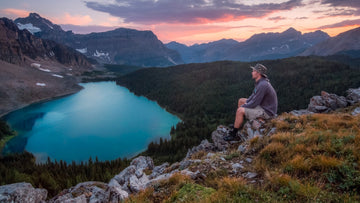A Must-Have Checklist for Hikers and Backpackers: The Ten Essentials
by Emily Jannet on Jul 24, 2023
Hiking and backpacking can take you through a variety of terrains and weather conditions. Being prepared with the Ten Essentials ensures you have the necessary tools and supplies to address any challenges that may arise during your journey. Let's delve into each of the Ten Essentials and their significance in the context of outdoor exploration.
-
Navigation
Navigation is a crucial aspect of hiking and backpacking. Carrying a map, compass, and a GPS device allows you to find your way even in unfamiliar territories. Familiarize yourself with reading maps and using a compass to navigate effectively.
-
Sun Protection
Protecting yourself from the sun's harmful rays is vital for your well-being. Carry sunscreen with a high SPF, a hat, sunglasses, and lightweight, breathable clothing that covers your skin. Don't forget to reapply sunscreen regularly.
-
Insulation
Weather conditions can change rapidly during outdoor adventures. It's essential to carry adequate insulation to stay warm and comfortable. Layering your clothing, including a waterproof and windproof outer layer, helps regulate body temperature.
-
Illumination
Having a reliable source of illumination is crucial, especially if you plan to hike during low light or at night. Bring a headlamp or flashlight with extra batteries to ensure you can see your surroundings and navigate safely.
-
First Aid Supplies
Accidents and injuries can happen during outdoor activities. Pack a comprehensive first aid kit that includes adhesive bandages, antiseptic ointment, pain relievers, tweezers, and any necessary personal medications. Familiarize yourself with basic first aid procedures.
-
Fire Starter
Fire can provide warmth, a means of cooking food, and a signal for help if needed. Carry waterproof matches, a lighter, or a fire starter kit. Ensure you're aware of fire regulations and safety guidelines in the area you're visiting.
-
Repair Kit and Tools
Carrying a repair kit and essential tools can help you fix gear and equipment on the go. Include items such as a multi-tool, a strong clear tape for tent repair, spare tent stakes, and repair patches for your sleeping pad or tent.
-
Nutrition
Fueling your body with adequate nutrition is essential during outdoor adventures. Pack lightweight, high-energy snacks and meals that are easy to prepare. Consider items like energy bars, trail mix, dehydrated meals, and plenty of water.
-
Hydration
Staying hydrated is crucial for maintaining your energy levels and overall well-being. Carry a sufficient amount of water and consider using a hydration system or water filter to replenish your supply from natural sources.
-
Emergency Shelter
In unexpected situations, having emergency shelter can be a lifesaver. Carry a lightweight, compact shelter option such as an emergency poncho or a tarp. It provides protection from the elements and helps retain body heat if needed.
Final Thoughts
The Ten Essentials serve as a comprehensive guide for hikers and backpackers to ensure their safety, comfort, and preparedness in the wilderness. By equipping yourself with these essentials and following best practices, you can embark on exciting adventures with confidence and peace of mind. Remember to respect nature, leave no trace, and enjoy the wonders of the great outdoors responsibly.
Frequently Asked Questions
- Can I go hiking without the Ten Essentials?
While it's possible to go hiking without the Ten Essentials, it's highly recommended to carry them for your safety and preparedness. They can make a significant difference in case of emergencies or unexpected situations.
- How much water should I carry for a day hike?
It's advisable to carry at least 2 liters of water per person for a day hike. However, the required amount may vary depending on factors such as weather conditions, trail difficulty, and personal hydration needs.
- Are there any additional items I should consider packing?
Apart from the Ten Essentials, you may want to pack a whistle for signaling, insect repellent, a small hand sanitizer, and a basic hygiene kit. Tailor your packing list according to the specific requirements of your trip.
- Should I bring a portable stove for cooking during backpacking trips?
Bringing a portable stove allows you to cook hot meals and enjoy a warm drink during your backpacking trips. It offers convenience and versatility, especially in areas where open fires are not permitted.
- Can I use my smartphone for navigation instead of a GPS device?
Smartphones can be a useful navigation tool, but they have limitations such as battery life and the availability of a cellular network. It's advisable to have a dedicated GPS device or carry physical maps as backup.





